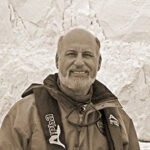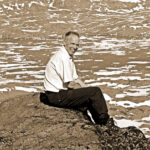Director/Principal Greenland Expedition Leader: John Englander is an oceanographer and leading expert on sea level rise, as well as Director and Co-founder of the Rising Seas Institute. He is the author of two highly acclaimed books: High Tide on Main Street (2012) and Moving to Higher Ground: Rising Sea Level and the Path Forward (2021), which clearly explain the science, the economic risks, and the opportunity to build a more resilient future.
John has led numerous expeditions to Greenland and the High Arctic, including dives under the polar ice cap. He has delivered high-level briefings on sea level rise to the U.S. Congress, the U.S. Air Force, the U.S. Naval Academy, corporate executives, and the heads of all eight Arctic nations’ Coast Guard services. His presentations have reached more than half a million people worldwide.
He has held leadership roles in both the private and nonprofit sectors, including as CEO of The Cousteau Society and The International SeaKeepers Society. John is a Fellow of both the Institute of Marine Engineering, Science and Technology (IMarEST) and The Explorers Club.








